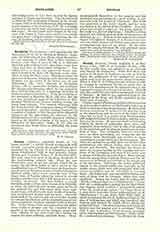

Nicolas, AUGUSTE, French apologist, b. at Bordeaux, January 6, 1807; d. at Versailles January 18, 1888. He first studied law, was admitted as an advocate and entered the magistracy. From 1841-49 he was justice of the peace at Bordeaux; as early as 1842 he began the publication of his apologetical writings which soon made his name known among Catholics. When in 1849 M. de Falloux became minister of public worship he summoned Nicolas to assist him as head of the department for the administration of the temporal interests of ecclesiastical districts. He held this office until 1854 when he became general inspector of libraries. In 1860 he was appointed judge of the tribunal of the Seine and finally councillor at the Paris court of appeals.
Nicolas employed his leisure and later his retirement to write works in defense of Christianity taken as a whole or in its most important dogmas. He showed his accurate conception of apologetics by adapting them to the dispositions and the needs of the minds of his time, but he lived in a period when Traditionalism still dominated many French Catholics, and this is reflected in his works. He aimed no doubt at defending religion by means of philosophy, good sense, and arguments from authority; but he also often appeals to the traditions and the groping moral sense of mankind at large. The testimonies, however, which he cites, are often apocryphal, and frequently also he interprets them uncritically and ascribes to them a meaning or a scope which they do not possess. Besides, his apologetics speedily grew out-of-date when ecclesiastical and critical studies were revived in France and elsewhere. His writings also betray at times the layman lacking in the learning and precision of the theologian, and some of his books were in danger of being placed on the Index. Some bishops, however, among them Cardinals Donnet and Pie, intervened in his behalf and certified to the uprightness of his intentions. Otherwise the author addressed himself to the general public and especially to the middle classes which were still penetrated with Voltairian incredulity, and he succeeded in reaching them. His books were very successful in France and some of them even in Germany, where they were translated. Among his works may be mentioned: “Etudes philosophiques sur le Christianisme” (Paris, 1841-45), a philosophical apology for the chief Christian dogmas, which reached a twenty-sixth edition before the death of the author; “La Vierge Marie et le plan divin, nouvelles etudes philosophiques sur le Christianisme” (4 vols., Paris, 1852, 1853, 1861), in which is explained the rfile of the Blessed Virgin in the plan of Redemption, and which was translated into German, and reached the eighth edition during the author’s lifetime; “Du protestantisme et de toutes les heresies dans leur rapport avec le socialisme” (Paris, 1852, 2 vols., 8 editions); “L’Art de croire, ou preparation philosophique au Christianisme” (Paris, 1866-67), translated into German; “La Divinite de Jesus Christ, demonstration nouvelle” (1864); “Jesus Christ introduction A. l’Evangile etudie et medite a l’usage des temps nouveaux” (Paris, 1875). As semi-religious and semi-political may be mentioned: “La Monarchie et la question du drapeau” (Paris, 1873); “La Revolution et l’orde chretien” (Paris, 1874); “L’Etat contre Dieu” (Paris, 1879); “Rome et la Papaute” (Paris, 1883); and finally the works in histori co-philosophic vein: “Etude sur Maine de Biran” (Paris, 1858); “Etude sur Eugenie de Guerin” (Paris, 1863); “Memoires d’un pere sur la vie et la mort de son fils” (Paris, 1869); “Etude historique et critique sur le Pere Lacordaire” (Toulouse, 1886).
ANTOINE DEGERT

